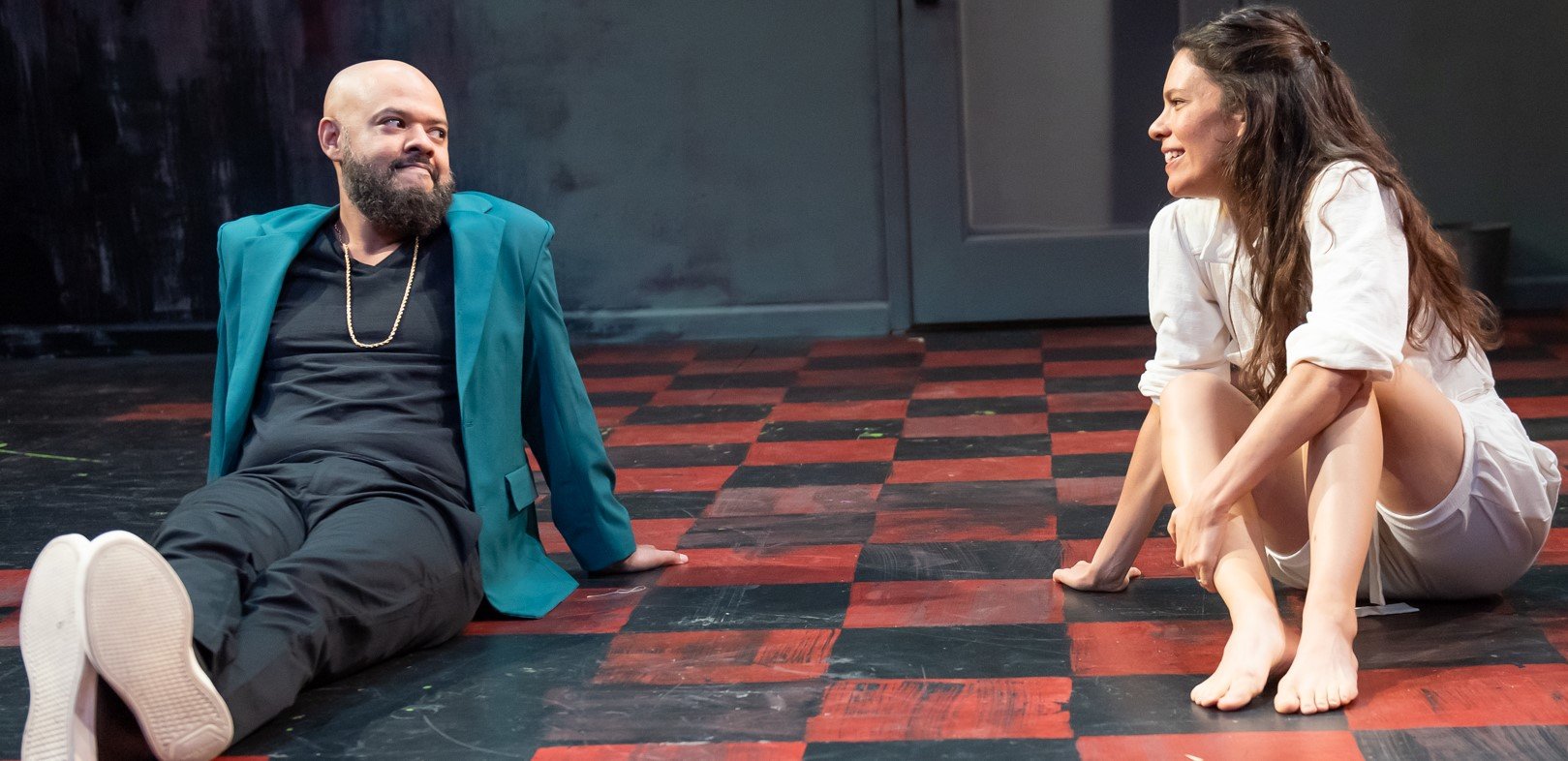Ryan Quinn plays Judge Brack and Susannah Millonzi is Hedda in Bedlam’s provocative reimagining of Hedda Gabler by Henrik Ibsen. Photographs by Ashley Garrett.
Just in time for Halloween, the Off-Off-Broadway troupe Bedlam is spicing up its presentation of Hedda Gabler with a Walpurgisnacht dance. That unexpected choreographic interpolation, with flashing lights, thump-y music, and Hellfire Club costumes, might strike the fancy of Sigmund Freud but would certainly surprise the play’s author, Henrik Ibsen—and perhaps also Jon Robin Baitz, whose adaptation, based on Anne-Charlotte Hanes Harvey’s translation, the production utilizes.
Eric Tucker, Bedlam’s artistic director, has reimagined Ibsen’s 1890 tragedy as an absurdist romp. Scenic designer John McDermott transports the play’s characters from the customary grandeur of their upper middle-class milieu to a wide expanse of tired-looking red and black linoleum tiles, with flea-market furniture and kitchen appliances that have seen better days. Daniele Tyler Mathews’s costumes (including a pale yellow romper for the title character and an array of distracting novelty socks all around) offer thrift-shop tackiness instead of the corseted propriety of late 19th-century Scandinavia. The lighting and sound designs by Carolina Ortiz and Jane Shaw, respectively, impose periodic bursts of cacophony and multicolored expressionism on this most staid and realistic of plays.
“Much of the time the antics of the Bedlam cast members are nearer to sketch comedy than character-focused acting. Though dutifully speaking the words of Ibsen’s drama, these players do the damnedest things. ”
Hedda Gabler takes place over 36 hours during which newlyweds George and Hedda Tesman (Tucker and Susannah Millonzi) become reacquainted with two people—Eilert Lovborg (Elan Zafir) and Thea Elvsted (Karen Alvarado)—whom they both knew several years before (though in separate circumstances). By the play’s end, all four will be undone by secrets their hidebound society demands they keep; and two of them will be dead.
George, an unimaginative scholar, believes his recent marriage is a love match. For Hedda, who’s intelligent, spirited, and devoutly committed to respectability, the union is a handy escape from the social awkwardness of spinsterhood. “I had danced myself tired,” she explains to family friend Judge Brack (Ryan Quinn), “and I wasn’t getting any younger.” Now decorously settled with George, Hedda is restless and ready to make mischief.
Eilert (George’s professional rival) skipped town after booze and debauchery made him a social pariah. Now sober, he’s the author of a new book that puts him in line for the glittering prizes that the less talented George covets. Thea, once a schoolmate of Hedda, has secretly supported Eilert in his reformation, fleeing an unhappy marriage to devote herself to him.
Neither Thea nor George realizes that, once upon a time, Hedda and Eilert had a secret alliance, which Hedda recalls as “thrilling and dangerous” (though conventionally chaste). In surreptitious conversations, Eilert gave Hedda vicarious tours of their town’s demimonde, which she, apprehensive of scandal, would never have visited. Now, observing Eilert with another woman, Hedda aches to have the power that Thea commands over him; and she hatches a plot, selfish and manipulative, to exorcise her boredom and frustration.
“In two moving duologues, the superb Zafir and Millonzi (as Eilert and Hedda) drop the Bedlam rowdiness and offer a brief, emotional glimpse of their characters’ damaged hearts.”
Much of the time the antics of the Bedlam cast members are nearer to sketch comedy than character-focused acting. Though dutifully speaking the words of Ibsen’s drama, these players do the damnedest things. When agitated, the very proper Hedda makes the sofa her trampoline, as a naughty child might do. Berte (Mike Labbadia), Hedda’s cross-dressing maid, pretends to attack her sleeping mistress with a hatchet. And stately Judge Brack, a would-be seducer, mimes frottage when he’s speaking confidentially to Hedda and no one’s looking. At the end of Act II, Berte, in S&M garb, leads that surprise Walpurgisnacht dance. By that point in the performance, the penny has long since dropped: the actors are playing what they imagine the subtext to be.
Over Bedlam’s 10-year existence, Tucker has applied his merry spin to numerous treasures of world theater (including plays by Shakespeare, Shaw, and Arthur Miller) with varying degrees of insight and felicity. The company’s approach proves problematic for Hedda Gabler, a text which hinges on conventions and strictures that tend to be alien to present-day audiences. Bedlam’s roistering, out-of-context performance style earns plenty of guffaws, but sheds limited light on Ibsen’s characters and their world. It leaves the spectator disengaged (which may be what Tucker and his comrades want). Yet, in two moving duologues, the superb Zafir and Millonzi (as Eilert and Hedda) drop the Bedlam rowdiness and offer a brief, emotional glimpse of their characters’ damaged hearts. Those moments suggest how effective this admirable cast might be if directed to play the text for all it’s worth and leave the subtext to look after itself.
Bedlam’s production of Hedda Gabler, directed by Eric Tucker, plays in repertory with The Winter’s Tale at the Irondale Center (85 S. Oxford St., Brooklyn) through Nov. 20. Evening performances of these plays are at 7 p.m. on Monday, Wednesday, Thursday, and Friday and 8 p.m. Saturday; matinees are at 3 p.m. Saturday and 1 p.m. Sunday. For tickets, information, and repertory schedule, visit bedlam.org or ovationtix.com.



